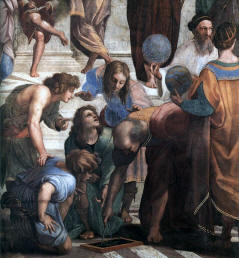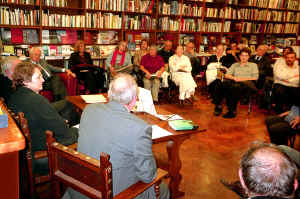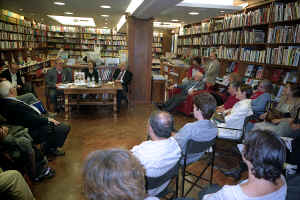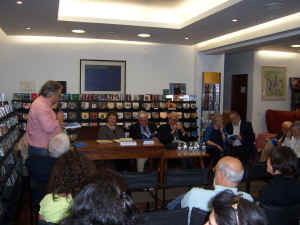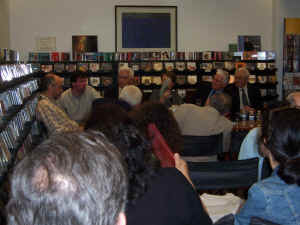|
6.º Caderno de Filosofia
das Ciências
Bachelard: Epistemologia,
Ciência e Poética
|

Organização e
Apresentação
de
Ana Gaspar |
Um encontro em torno do pensamento de Gaston
Bachelard convoca de imediato, quase sem darmos por isso, saberes
contraditórios, verdadeiramente distantes. Desconexão seria, por
isso, a primeira impressão que um leitor desprevenido poderia
recolher do conjunto de textos reunidos neste caderno. É certo que a
dualidade da obra de Bachelard - entre a epistemologia racionalista
e a poética - é reconhecida por todos e também por ele mesmo. Mas,
por outro lado, há nessa obra uma coerência singular. escondida,
para alguns; aberta e nítida, para outros. De qualquer forma, só um
pensador inteiro, que aceita o lado diurno e o lado nocturno da
alma, um Janus Bifrons, como o designa Gaston Gilles Granger,
reuniria em torno de si, um conjunto de investigadores vindos de
lugares tão diversos: sociologia, psicanálise, filosofia,
psiquiatria, física, literatura. |
|
|
7.º Caderno de Filosofia
das Ciências
Wittgenstein, a prova e a
actividade matemática: uma introdução
|

de
Nuno Miguel Proença
|
«A inspiração
inicial da primeira versão deste texto foi o seminário «Le corps de
la preuve» que Fernando Gil levou a cabo em 1997/1998 na École des
Hautes Études en Sciences Sociales. A versão actual, com algumas
modificações, inscreve-se na série de trabalhos que o grupo de
pesquisa «Descoberta, Invenção, Criação» do Centro de Filosofia das
Ciências da Universidade de Lisboa dedica à filosofia da matemática»
(Nuno Proença). |
|
|
8.º Caderno de Filosofia
das Ciências
On Kuhn's Philosophy and its Legacy
|

Edited by
Juan Manuel Torres
|
This book is a
contribution to the studies on Kuhn's thought and its present
influence on philosophy, history of science and science. Among other
themes, it contains neglected or forgotten areas such as the
influence of Kuhnean doctrine on the dynamics of the change in
Biology, the structuralist view of theories and the Friedman's
Kantian ideas. Applications of Kuhn's criteria to the theory of
health and information science are also focused in the volume,
together with studies concerning the importance of epistemological
values for the phenomenon of incommensurability. the relationships
between Kuhn's theses and the present controversy
realism-antirealism, on one hand, and a revisited Carnap's
philosophy, on the other, are other remarkable chapters. Finally,
studies regarding the evolution of Kuhn's doctrine, the influence of
the New Look school of Psychology on The Structure of
Scientific Revolutions, the poorly known interaction between
Kuhn and Duhem and the problem of a dialogue capable of involving
historians and philosophers of science, complete the main contents
of this book. |
|
|
9.º Caderno de Filosofia
das Ciências
Cinco Ensaios sobre Wittgenstein
|

de
João Esteves da Silva
|
«Os cinco ensaios que
dediquei ao pensamento de Wittgenstein, que considero um dos mais
geniais filósofos, não só do século XX, mas de toda a história da
filosofia ocidental, têm por intenção procurar dissipar o espesso
manto de desentendimentos em que a imensa maioria dos seus
comentadores conseguiu envolver o seu pensamento, o que aconteceu,
não uma mas por duas vezes; uma primeira vez, quando o Círculo de
Viena pura e simplesmente tresleu o Tractatus e tentou
transformar Wittgenstein no maior arauto do positivismo lógico; uma
segunda, quando os seus mais fiéis discípulos e seguidores
procuraram anexar o seu pensamento à filosofia da linguagem comum (a
que ingleses e franceses chamam ordinária, mas que em português
daria um enorme contra-senso) com as implicações relativistas e, por
vezes, niilistas que daí decorrem. Trata-se pois de uma leitura
contra corrente, o que é quase sempre mais difícil mas infinitamente
mais divertido. Não é, porém, um panegírico: os ensaios procuram
pensar sempre com Wittgenstein, mas, por vezes, contra Wittgenstein,
o que é a única maneira realmente produtiva de ler um grande
filósofo». João
Esteves da Silva |
|
|
10.º Caderno de Filosofia
das Ciências
Henri Poincaré - Filosofia da Matemática
Breve antologia de textos de Filosofia da Matemática de Henri Poincaré
|

Henri Poincaré
Organização e edição de Augusto
J. Franco de Oliveira
(onde adquirir: READonTIME)
|
«Leigos e filósofos
profissionais ainda lêem e discutem os textos filosóficos de
Poincaré, porque este tocou em assuntos que, volvidos cem anos,
ultrapassam o mero interesse histórico e estão longe de esgotados.
Esta antologia compreende alguns dos mais importantes textos de
Poincaré relativos à Filosofia da Matemática, publicados na última
dácada do séc. XIX e primeira do séc. XX. Os artigos cobrem
diferentes assuntos que foram agrupados em três Partes:
I. Intuição e Raciocínio;
II. Matemática e Lógica;
III. Geometria e Convencionalismo;
Uma boa parte dos artigos seleccionados foi objecto de leitura e
estudo em seminários no âmbito do projecto “Poincaré, Filósofo da
Ciência” (PTDC/FIL/64748/2006) ao longo dos anos 2008-10.»
Augusto Franco de Oliveira |
|
|
|
|
11.º Caderno de Filosofia
das Ciências
Poincaré's Philosophy of Mathematics:
Intuition Experience Creativity
|
|

Poincaré's
Philosophy of Mathematics: Intuition Experience Creativity
Hassan Tahiri (Org. and Ed.)
(onde adquirir: )
|
This Volume is composed of series of lectures
delivered at the CFCUL by some of the leading experts on Poincaré’s
philosophy of mathematics. The outcome is strikingly different from
the standard interpretation portrayed and propagated for decades
mainly by some scholars of analytic philosophy that negatively
characterized Poincaré's views. Instead of putting the spotlight on
his alleged psychological tendency and his inability to appreciate
modern logic due to his ignorance of the subject matter, the
contributors aim rather to understand some major insights involved
in Poincaré’s brilliant style of arguing and to provide a coherent
view of his philosophy of mathematics and that of science in
general.
The Contents: Introduction. Poincaré's Philosophy
of Mathematics by J. Folina. Henri Poincaré: Conservateur ou Moderne?
by G. Heinzmann. Hilbert and Poincaré and the Paradoxes by R. Kahle.
The Principle of Mathematical Induction in Poincaré’s Criticisms of
Logicism and Formalism by F. Oliveira. Thinking Geometry: a Matter
of Philosophy. The Case of Helmholtz and Poincaré by M. de Paz.
Idealization as Prescriptions and the Role of Fiction in Science:
Towards a Formal Semantics by S. Rahman. La logique du raisonnement
mathématique selon Poincaré by H. Tahiri.
|
|
|
|
|
12.º Caderno de Filosofia
das Ciências
Poincaré e a Física
|
|

Poincaré
e a Física
Isabel Serra e María de Paz (Orgs. e Eds.)
(onde adquirir: )
|
This Volume is composed of some Poincaré’s major papers on the
philosophy of physics translated into Portuguese. The texts are
noted and commented in order to insert Poincaré’s thought in the
physics of the time, as well as to understand the author’s
references to the ideas of other authors. The Introduction presents
Poincaré’s relationship with physics, both in terms of teaching and
research, and reports their main results on several domains of
physics. It was added a small biography which gives an overview on
Poincaré’s scientific life and also a bibliography. Translation, as
well as Introduction, notes, commentary, Biography and Bibliography
were made by Isabel Serra and María de Paz
The Contents:
Chapter IX and X of Science and Hypothesis (La
Science et l’Hypothèse, 1902), also published in the proceedings of
the Congrès International de Physique, Paris, 1900, t. I, pp. 1-29,
in Revue générale des sciences pures et appliquées, 11, 1900, pp.
1163-1175 and Revue scientifique, 14, 1900, 4ème série, pp. 705-715.
Chapter XII of Science and Hypothesis, also published in the
prefaces of Theorie Mathématique de la Lumière (1889) and
Electricité et optique(1901). Chapters VII, VIII and IX of The Value
of Science (La Valeur de la Science, 1905), that were presented in
the International Conference at St Louis (1904) and also published
in the Bulletin des Sciences Mathématiques, 28, pp. 302-324, 1904.
|
|
|
|
|
|
|
|
